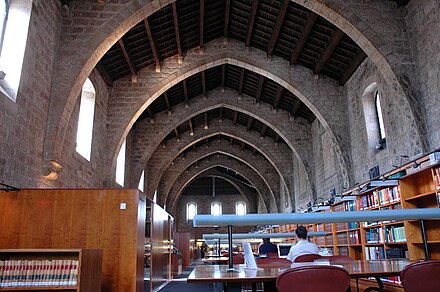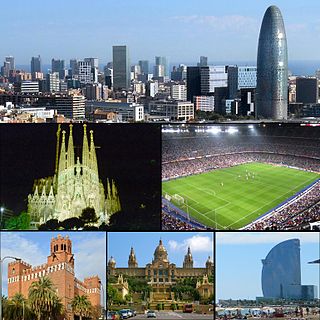
Catalonia is an autonomous community in Spain on the northeastern corner of the Iberian Peninsula, designated as a nationality by its Statute of Autonomy. Catalonia consists of four provinces: Barcelona, Girona, Lleida, and Tarragona. The capital and largest city is Barcelona, the second-most populated municipality in Spain and the core of the sixth most populous urban area in the European Union. It comprises most of the territory of the former Principality of Catalonia. It is bordered by France (Occitanie) and Andorra to the north, the Mediterranean Sea to the east, and the Spanish autonomous communities of Aragon to the west and Valencia to the south. The official languages are Catalan, Spanish, and the Aranese dialect of Occitan.
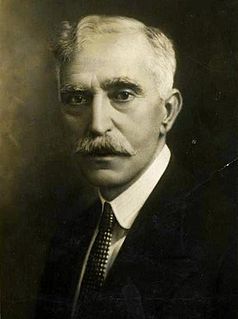
Francesc Macià i Llussà was the 122nd President of Catalonia and formerly an officer in the Spanish Army.
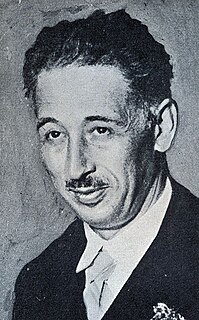
Lluís Companys i Jover was a Spanish politician. He was the President of Catalonia (Spain), from 1934 and during the Spanish Civil War.

The former Hospital de la Santa Creu i Sant Pau in the neighborhood of El Guinardó, Barcelona, Catalonia, Spain, is a complex built between 1901 and 1930, designed by the Catalan modernisme architect Lluís Domènech i Montaner. Together with Palau de la Música Catalana, it is a UNESCO World Heritage Site.
The Government of Catalonia or the Generalitat de Catalunya is the institution under which the Spanish autonomous community of Catalonia is politically organised. It consists of the Parliament of Catalonia, the President of the Generalitat de Catalunya, and the Executive Council of Catalonia.

Jordi Pujol i Soley is a Spanish politician who was the leader of the party Convergència Democràtica de Catalunya (CDC) from 1974 to 2003, and President of the Generalitat de Catalunya from 1980 to 2003.
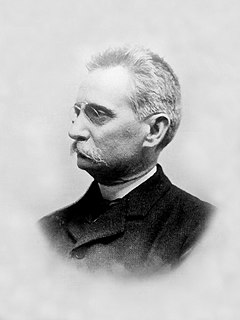
Lluís Domènech i Montaner was a Spanish architect who was highly influential on Modernisme català, the Catalan Art Nouveau/Jugendstil movement. He was also a Catalan politician.

The National Day of Catalonia is a day-long festival in Catalonia and one of its official national symbols, celebrated annually on 11 September. It commemorates the fall of Barcelona during the War of the Spanish Succession in 1714 and the subsequent loss of Catalan institutions and laws.
Football is the most important sport in Catalonia and was introduced in the late 19th century by a combination of mostly British immigrant workers and visiting sailors, and students returning from Britain. Catalonia led the way in the development of football in Spain, organising both the first association and the first league. Today football in Catalonia is organized by the Catalan Football Federation and the RFEF and teams from Catalonia compete in La Liga, the Copa del Rey, the Copa Catalunya and several European competitions.
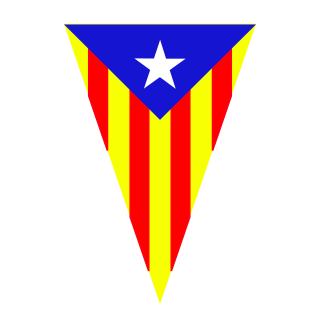
Estat Català is a pro-independence nationalist historical political party of Catalonia (Spain).

Barcelona'sculture stems from the city's 2000 years of history. To a greater extent than the rest of Catalonia, where Catalonia's native Catalan is more dominant, Barcelona is a bilingual city: Catalan and Spanish are both official languages and widely spoken. Since the arrival of democracy, the Catalan culture has been promoted, both by recovering works from the past and by stimulating the creation of new works.
The "Catalan of the Year" award is organized by El Periódico de Catalunya, which since 2000 recognizes the Catalan person that was the most prominent in the development of their social or professional activity during the previous year. The award is voted by readers of the newspaper, after a previous selection of different nominees by am jury composed of persons from different social environments.
The Museu Tèxtil i d'Indumentària, in English Textile and Clothing Museum, is a museum opened on 1982 and located in the Palau Reial de Pedralbes in Barcelona. The museum possesses countless objects and pieces of major artistic and historical value that make up their collections of garments, fabrics and jewellery. Regarding their collection of clothes, the museum allows you to take a journey through the history of textiles, from the 16th century right up to the modern day. The museum's collections include Coptic, Hispano-Arab, Gothic and Renaissance fabrics, as well as embroidery, a section on lacework and a collection of prints. Also worth mentioning is the jewelry collection, comprising approximately five hundred pieces that were made and produced in Spain.
The Name and Title Authority File of Catalonia (CANTIC) is an authority union catalogue within the Union Catalogue of Universities of Catalonia (CCUC), that it is led by the Biblioteca de Catalunya. Its goals are to standardize the access points in bibliographic catalogues, to improve communication among catalogues and mainly, to make easier the information research and retrieval. CANTIC gives a special treatment to name and title authorities related with Catalan culture. These authorities receive a complete authority work and provide, eventually, access to the Enciclopèdia Catalana.
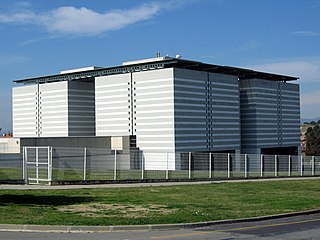
The National Archive of Catalonia (ANC), is a body created by the Generalitat of Catalonia by decree 28 November 1980. Located in Sant Cugat del Vallès, it is the Catalonia government's official archive, and holds both government and private documents relating to Catalonia's society, politics, economics and history. As government's historical archive, the ANC collects, preserves and disseminates the most relevant records of Catalonia's political and administrative activity of the departments, institutions and companies that make up the Government of Catalonia.

Neus Català i Pallejà was a member of the Unified Socialist Party of Catalonia during the Spanish Civil War and was the only Catalan survivor of the concentration camp of Ravensbrück.

Dolors Lamarca y Morell is a Catalan librarian and philologist. She has led the Service of Libraries and Bibliographic Heritage of the Generalitat de Catalunya, and has directed the National Library of Catalonia.

Francoism in Catalonia was established between 1939 and 1977, following the Spanish Civil War and post-war Francoist repression. Francisco Franco's regime replaced Revolutionary Catalonia after the Catalonia Offensive at the end of the war. The dictatorship in Catalonia complemented the suppression of democratic freedoms with the repression of Catalan culture. Its totalitarian character and its unifying objectives meant the imposition of a single culture and a single language, Castillian. The regime was specifically anti-Catalan, but this did not stop the development of a Catalan Francoism that was forged during the war and fed by victory.
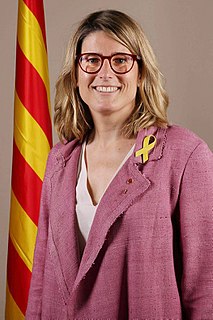
Elsa Artadi i Vila is a Catalan economist, academic and politician. Artadi is a member of the Parliament of Catalonia and was previously Minister of the Presidency and Government Spokesman of Catalonia.



